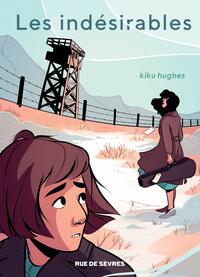Take a photo of a barcode or cover
adventurous
emotional
sad
fast-paced
Plot or Character Driven:
Plot
Strong character development:
No
Loveable characters:
Complicated
Diverse cast of characters:
Yes
Flaws of characters a main focus:
Complicated
emotional
hopeful
informative
reflective
sad
medium-paced
Plot or Character Driven:
A mix
Strong character development:
Complicated
Loveable characters:
Yes
Diverse cast of characters:
Complicated
Flaws of characters a main focus:
No
It was interesting to read two books focusing on the Japanese internment at the same time. They were very different from each other, this one being more of a novel than a history text. What I liked most about this book was how Kiku realizes the reason why she doesn't know how to read or speak Japanese or has participated in Japanese culture was because of the distance her grandmother had put between her family and those things due to be in the camps and Kiku's mother continued the distance herself. You can clearly see the ripple effect the camps had on Issei and Nissei in America. It was strangely, something I never considered when I wondered why my Bachan spoke Japanese to others her age, but never really to my mom and her siblings or us. Just another thing to be sad about and work to change.
emotional
informative
inspiring
sad
fast-paced
Plot or Character Driven:
A mix
Strong character development:
Yes
Loveable characters:
Yes
Diverse cast of characters:
No
Flaws of characters a main focus:
Complicated
emotional
reflective
sad
fast-paced
Plot or Character Driven:
Character
Strong character development:
Yes
Loveable characters:
Yes
Diverse cast of characters:
Yes
Flaws of characters a main focus:
No
I am always so upset that we didn't learn more about Japanese Internment Camps in school. I feel like we only learned about what other countries did to people and not what our country did to our citizens. I really liked this. I thought the artwork was beautiful, the story telling was incredible, and am always shocked when I can feel a deep connection with characters in such a short story. I really enjoyed this and would recommend it to anyone.
emotional
informative
reflective
fast-paced
Plot or Character Driven:
Plot
Strong character development:
Yes
Loveable characters:
Yes
Diverse cast of characters:
Yes
Flaws of characters a main focus:
No
emotional
hopeful
informative
inspiring
reflective
sad
medium-paced
Plot or Character Driven:
Character
Strong character development:
Yes
Loveable characters:
Yes
Diverse cast of characters:
Yes
Flaws of characters a main focus:
Yes
This book gives an amazing account of the Japanese incarceration camps and how they impacted Japanese American families for generations to come. You have to think hard about ways to make sure that America does not repeat this mistake.
challenging
informative
reflective
medium-paced
Plot or Character Driven:
A mix
Strong character development:
Complicated
Loveable characters:
Complicated
Diverse cast of characters:
Yes
emotional
informative
sad
medium-paced
Plot or Character Driven:
A mix
Strong character development:
Yes
Loveable characters:
Yes
Diverse cast of characters:
Yes
Flaws of characters a main focus:
Yes
emotional
informative
sad
fast-paced
Plot or Character Driven:
Character
Strong character development:
Yes
Loveable characters:
Yes
Diverse cast of characters:
Yes
Flaws of characters a main focus:
No
Spoiler
I absolutely loved this graphic novel by Kiku Hughes!I received an ARC of this from NetGalley and First Second Books in exchange for an honest review. This heartfelt and engaging graphic novel follows the story of young Kiku as she is transported back in time to when her grandmother Ernestina was a teenager in a Japanese internment camp during WWII. Kiku documents what she is seeing and experiencing during her “displacement” to another era. She never interacts with her grandmother, but she fills the gaps in her knowledge from not knowing about that time in her grandmother’s life or really knowing her grandmother at all. Kiku makes friends along the way with other teens and bold, smart older women and sees what life was like for young people and families in the camps during that time.
The art and use of a muted color scheme was beautiful and helped to cultivate the whimsical yet melancholy mood of the story. Kiku’s romantic connection with May was sweet and reflected some of the small ways that people could find joy and levity amidst their circumstance.
Kiku’s story shows how her white passing experience from being half-Japanese combined with not knowing the Japanese language or much about her grandmother’s life have together created a fragmented and disjointed connection to her Japanese heritage. The story ends with Kiku talking honestly with her mother about these feelings (once she returns to modern time), and they journey together into connecting with Ernestina through memories and tokens from the past. Kiku's mother also teaches Kiku about the origins of the "model minority" mindset born in the aftermath of the camps and the role it played in anti-Black racism. The story ends with a connection between resistance to the camps then to resistance to the present day detainment camps at the border via Kiku and her mom getting involved in activism together. I think Kiku’s story will resonate with young people who have a mixed identity and/or don’t have direct connections to older relatives from marginalized and non-white communities. Highly highly recommend once this comes out later this year!







